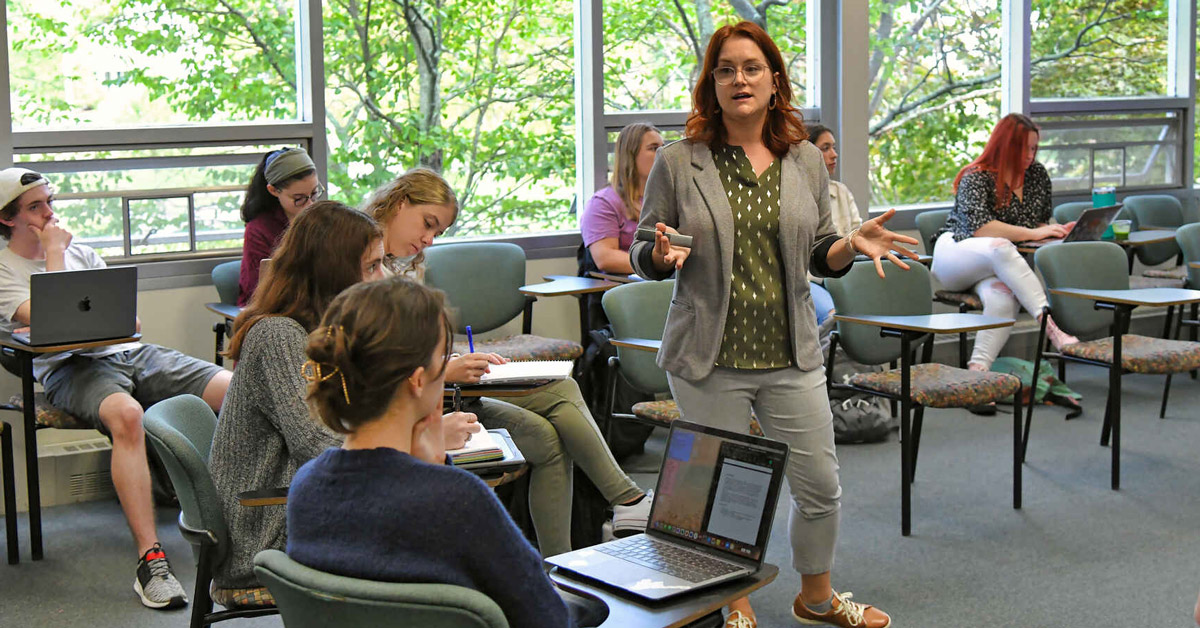A new course in social and emotional learning

Wheaton professor prepares future K–12 teachers with classroom methods for personal growth, well-being
Assistant Professor of Education Alessandra Ward, a former elementary school teacher, believes that social and emotional learning (SEL) is crucial to academic success, personal growth and well-being for K–12 students. So, this semester, the professor is teaching “Transformative SEL,” a new course specifically designed for Wheaton students who are considering a career in education, but also open to others. It encourages them to reflect on their own social and emotional development; provides methods for teaching SEL to K–12 learners; and ways classroom teachers can support students in becoming changemakers. Wheaton magazine editor Sandy Coleman asked her about the course.
What is social and emotional learning?
“According to the Collaborative for Academic, Social, and Emotional Learning [the nation’s most prominent SEL organization], social-emotional learning is ‘the process through which all young people and adults acquire and apply the knowledge, skills and attitudes to develop healthy identities, manage emotions and achieve personal and collective goals; feel and show empathy for others; establish and maintain supportive relationships; and make responsible and caring decisions.’”
Why is it important to gain an understanding of SEL—especially now?
“With so many children and adolescents experiencing social isolation, the pandemic highlighted for so many how social and emotional learning is crucial for students’ well-being. In the wake of the deaths of George Floyd and others too numerous to name, and the nation’s long-overdue reckoning with issues related to diversity, equity, inclusion and belonging, a transformative approach is essential.”
How is the course transformative?
“Transformative SEL is a particular lens on the topic, originally developed by [psychologist] Robert Jagers and colleagues, that centers around equity and justice. In the course, we talk about how we learn to recognize and act on issues of injustice, how structures and systems influence individuals’ behavior, and how our cultural practices affect what we care about and how we express ourselves. We examine how things like race, income level and gender shape social-emotional development and how to create environments that help everyone feel like they belong.”
What excites you most about your SEL course?
“The thing I love most about teaching this course is how much I get to structure the course around relationships. This is a course about social and emotional learning, after all. I get to build in all kinds of opportunities for students to get to know themselves and each other better, and for me to relate to students in new and more egalitarian ways.
“For example, I build in a lot of opportunities for students to share their own social-emotional expertise. In a recent class on mindfulness and meditation techniques for self-awareness, two students designed and led lessons on metacognition and loving-kindness meditations. I also did an activity that allowed all students to share self-management strategies they use to manage their time, advocate for themselves and manage stress. We compiled the strategies into a resource that all students can access.”
How can the course benefit students from a variety of majors?
“This is a foundational course in education, which means one of our focuses is learning how to support K–12 students in their social and emotional development. We learn the basics of lesson planning, how to teach SEL in ways that are anti-racist and culturally responsive, and how teachers can engage with families and communities to collaboratively support students’ SEL. These skills are particularly helpful for future educators, but can also be useful to students who take other kinds of leadership roles with their peers, children and adolescents, such as camp counselor, babysitter/nanny, peer academic mentor or resident assistant.”
What inspired you to develop this course?
“I designed this course in response to what I see as a real gap in teacher education programs, generally. It’s rare for whole courses to be dedicated to this important topic, and even rarer for those courses to take a transformative lens that focuses on equity. I’m excited to be stepping into that gap here at Wheaton.”
What do you hope students gain most from this course?
“I hope that every student who takes this course, regardless of major or interest in education, walks away with a deeper understanding of their own social and emotional development, including how it was and continues to be shaped by constructs such as race, culture, class and gender, and a greater respect for ways of interacting socially and emotionally that are different from their own.”
What lessons are there to be learned that would benefit the world beyond Wheaton?
“One of my units later in the course is titled ‘Teaching SEL and Supporting Students in Becoming Changemakers.’ I think the world beyond Wheaton would benefit from recognizing the incredible capacity children and adolescents have to recognize and respond to injustice in the world, to make change. I think it’s part of our responsibilities as adults who interact with children and adolescents to support them in developing these capacities, whether that’s through explicit SEL instruction as teachers, or in whatever way we find ourselves in a relationship with youth.”
